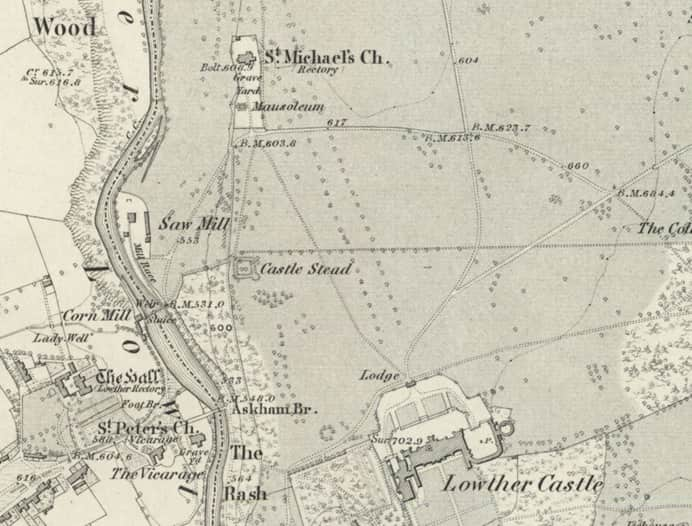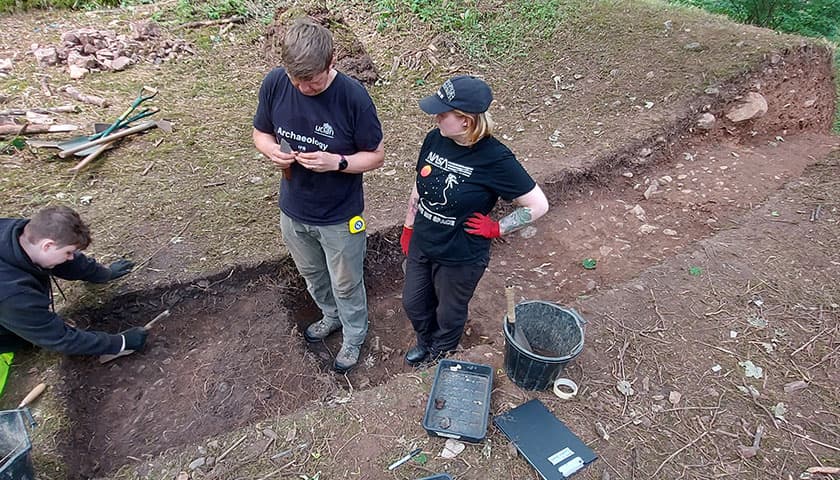
Lowther Medieval Castle and Village
Overlooking the Bampton Valley on the edge of the Lake District, the picturesque ruins of Lowther’s nineteenth-century castle are one of the region’s most popular attractions. Less well known are the earthworks immediately to the north, the remains of a medieval castle and village. Preliminary work suggests the site may date to the late eleventh or early twelfth century. If so, it could provide rare evidence of the conquest of Cumbria by King William Rufus and his brother, King Henry I – a generation after the Normans seized control of the rest of England. The site is potentially of national significance but has never been fully investigated. Who built the castle and its settlement, when and why? The Lowther Medieval Castle and Village project brings together historians and archaeologists from the North West to uncover the site’s biography, writing a new chapter in the history of medieval Britain and castle studies.
In 2023, funded by the Castle Studies Trust (CST), the team conducted archival research and a geophysical survey and excavations of the castle and village. Phase Two investigations in 2024 will dig further into the site's history, funded by the CST and the Cumberland and Westmorland Antiquarian and Archaeological Society (CWAAS). Our team will be conducting a geophysical survey and excavating the earthwork castle in Lowther's north park from Monday 13th to Friday 31st May 2024, and welcomes visitors. For press enquiries and to ask about group tours, and for information on visiting Lowther Castle and Gardens, please see below.

Lowther Medieval Castle and Village project
Uniting History and Archaeology, the project brings together Lancaster University, the University of Central Lancashire (UCLan), Allen Archaeology and Lowther Castle and Gardens Trust.
Press Release
History and Archaeology in Medieval Cumbria
The team aims to uncover important new evidence for a critical period in Britain’s past. Unlike the rest of England, Co. Cumbria was not conquered by the Normans in 1066. The region was historically part of the Kingdom of Cumbria, which stretched from Strathclyde across the Solway. Then, while the Normans were conquering lowland England, the area from Lowther northwards was conquered by the Scottish king Máel Coluim III. Cumbria was only annexed by the Normans in 1092, when William the Conqueror’s son, William Rufus, led an expedition to the area. According to the Anglo-Saxon Chronicle, the king then ‘sent many peasant people with their wives and cattle to live there and cultivate the land’. An earthwork survey has suggested the castle is an early Norman ringwork, with a planned settlement. Could Lowther’s medieval castle and village date from this era? There is little written evidence for Cumbria in the early and central Middle Ages: since this region was not part of William the Conqueror’s kingdom it was left out of Domesday Book, and few records have otherwise survived. Whatever the investigation finds, the archaeology at Lowther offers a fantastic opportunity to understand life in medieval Cumbria.
Digging into Medieval Cumbria: Lowther Medieval Castle and Village Project 2023
Uniting History and Archaeology across the North West to uncover the hidden history of medieval Cumbria, the project team conducted archival investigation and a geophysical survey and excavation at Lowther in 2023. The project was featured on BBC2's Digging for Britain.

Project Team on Digging for Britain
The 2023 project was showcased on BBC2's flagship archaeology series, Digging for Britain (Series 11, Episode 1, which aired in January 2024). From left to right here: project lead Dr Sophie Ambler (Lancaster Unviersity), student archaeologists from UCLan, Digging for Britain presenter Professor Alice Roberts, and Jonny Milton (Allen Archaeology) and Dr Jim Morris (UCLan), who oversaw the excavations.

Lowther's medieval archive
Dr Sophie Ambler, Reader in Medieval History at Lancaster University, revealed the records of Lowther's medieval past on BBC2's Digging for Britain, presented by Professor Alice Roberts.

Lowther's medieval castle in the Lowther archive
This charter from the Lowther family archive records a grant in Lowther by Alice daughter of Peter of Thrimby to Hugh of Lowther, including a quitclaim to Hugh of rights in an eighth of an acre ‘above the castle’. This likely refers to the ringwork castle under investigation. Image: Carlisle Archive Centre, Carlisle, DLONS/L/5/1/26 LO35, Copyright Lowther Estates.

Student archaeologists examine medieval records
Lowther's medieval archive contains charters offering a glimpse into life in the medieval settlement. Student archaeologists from UCLan took a break from excavating the castle during filming for Digging for Britain to examine a selection of the records.

Geophysical survey
As part of the 2023 investigation, Robert Evershed from Allen Archaeology conducted a geophysical survey of the medieval village, assisted by student archaeologists from UCLan. The results reveal the remains of housing platforms and the trackway linking the castle and village.

Lowther's ringwork castle
Hidden in the woodlands of Lowther's north park are the earthworks of the monumental structure the project is investigating: a partial ringwork castle likely dating to the Norman conquest of Cumbria. The team opened a trench in the ringwork's northern bank as part of the 2023 excavations. Image © Anthony Rumsey.

Trench Two
Trench Two of the 2023 dig investigated the northern bank of the ringwork castle and the castle's interior. Here Dr Jim Morris (UCLan) examines evidence of the medieval floor surface with UCLan student archaeologists. Image © Anthony Rumsey.

Exploring the castle on Digging for Britain
In filming Digging for Britain, Dr Jim Morris (UCLan) showed the programme's presenter, Professor Alice Roberts, around the castle excavations at Lowther, where student archaeologists and Allen Archaeology were hard at work. Image © Anthony Rumsey.

Lowther's medieval castle reconstructed
In filming Digging for Britain, presenter Professor Alice Roberts sketched what Lowther's medieval castle may have looked like, drawing from descriptions by the project team. A partial ringwork castle sited on the edge of an escarpment, this was a simple structure comprising a monumental mound and bank surmounted by a timber palisade, likely with a gatehouse, watchtower and interior buildings. Image © Alice Roberts.

Excavation visits
Throughout the 2023 excavation, the project team welcomed visitors to the site and offered tours. Here, Dr Sophie Ambler (Lancaster Unviersity) introduces the site to delegates from the project's funders, the Castle Studies Trust.

Dig Diary
Read about the 2023 investigation via the project's Dig Diary, hosted by the Castle Studies Trust, for more on the historical sources for medieval Cumbria and how the four-week excavation at Lowther unfolded.
Dig Diary
Project Team
Funded by: Castle Studies Trust
Project Lead: Dr Sophie Thérèse Ambler, Reader in Medieval History and Deputy Director of the Centre for War and Diplomacy, Lancaster University
Site Director: Tobin Rayner, Allen Archaeology
Student Archaeology Lead: Dr Jim Morris, Senior Lecturer Archaeology and Course Leader Archaeology & Anthropology, UCLan
David Bliss, CEO Lowther Estates
Charlotte Fairbairn, Exhibition Curator, Lowther Castle and Gardens
Contact the project team
For general enquiries about the project, please contact Dr Sophie Thérèse Ambler: s.ambler@lancaster.ac.uk
For press enquiries, please contact Anne Rothwell: a.rothwell@lancaster.ac.uk







